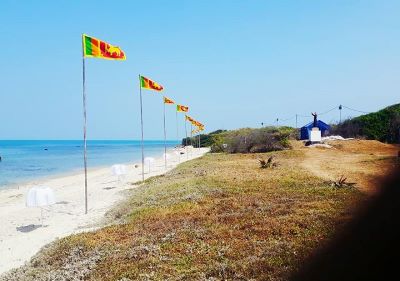Context-
The Katchatheevu islet, situated in the Palk Strait between India and Sri Lanka, has been a contentious issue, particularly in Tamil Nadu's political landscape. Its transfer from India to Sri Lanka in 1974 through an agreement between then Prime Ministers Indira Gandhi and Sirima R.D. Bandaranaike has sparked debates, protests, and political maneuvers over the years. We look into the historical background, the significance of Katchatheevu to the fisherfolk, the political utilization of the issue, and the evolving stance of the Union government.
Historical Background
The dispute over Katchatheevu ( 285-acre island) traces back to colonial times when both India and Sri Lanka were under British rule. Sri Lanka laid claim to the islet based on Portuguese occupation during the 16th to 17th centuries, while India asserted historical ownership through the jurisdiction of the erstwhile Raja of Ramnad. Negotiations began in 1921 between the governments of Madras (now Tamil Nadu) and Ceylon (now Sri Lanka), culminating in the 1974 agreement.
The agreement signed by Indira Gandhi and Sirima R.D. Bandaranaike defined the boundary between India and Sri Lanka, placing Katchatheevu under Sri Lankan control. Despite historical claims and protests, the decision was upheld, leading to discontent among political parties and the people of Tamil Nadu.
Legal battles ensued, with petitions filed in the Supreme Court of India, arguing that the 1974 agreement affected Indian fishermen's traditional rights and livelihood. Despite political rhetoric, there has been no concrete move from the Indian government to retrieve Katchatheevu, with the matter remaining sub judice.
Sri Lanka maintains that Katchatheevu's status is settled by international agreements and has not received any official communication from India regarding its return.
While political leaders engage in rhetoric, the foreign policy approach remains cautious, with no indication of active efforts to revisit the issue.
Significance to Fisherfolk
Katchatheevu holds significant importance for fisherfolk from both India and Sri Lanka, who have traditionally utilized its waters for fishing. Despite the transfer of sovereignty to Sri Lanka, fishing activities continued, albeit regulated by subsequent agreements. The annual festival at St. Anthony's Church on the islet serves as a cultural and religious gathering, symbolizing the shared heritage of the two nations' fishing communities.
The 1976 supplemental pact further regulated fishing activities, stipulating that vessels and fishermen from either country must obtain express permission from Sri Lanka or India before engaging in fishing in the designated waters. This restriction has led to tensions and occasional conflicts between fishermen and authorities from both nations.
Political Utilization
The Katchatheevu issue has been consistently exploited by political parties in Tamil Nadu, particularly during election seasons, to rally support and garner votes. Parties like the DMK, AIADMK, and BJP have used the issue to criticize opponents, accusing them of neglecting Tamil Nadu's interests and capitulating to Sri Lanka.
Leaders like M.K. Stalin and Jayalalithaa have advocated for the retrieval of Katchatheevu, appealing to sentiments of Tamil pride and sovereignty. Their demands for the islet's return or lease in perpetuity have resonated with sections of the Tamil population, leading to sustained pressure on the Union government to address the issue.
Union Government's Stance
The Union government's position on the Katchatheevu issue has evolved, reflecting diplomatic complexities and legal interpretations. Initially, the government defended the 1974 agreement, arguing that no Indian territory was ceded to Sri Lanka and that the islet was a matter of dispute between British India and Ceylon.
In recent years, however, the Union government has reiterated that Katchatheevu lies within Sri Lankan territory based on the international maritime boundary line. This stance has faced scrutiny and criticism from Tamil Nadu's political leaders and civil society, who continue to demand a reassessment of India's position and efforts to reclaim the islet.
Recent Developments
The resurgence of the Katchatheevu issue in the lead-up to the Lok Sabha elections underscores its enduring relevance in Tamil Nadu's political discourse. Prime Minister Narendra Modi's remarks accusing the Congress of relinquishing Katchatheevu have reignited debates and tensions surrounding the issue.
The Union government's response, citing the 1974 and 1976 agreements and emphasizing the sub judice status of the matter, reflects its cautious approach to addressing the complexities of the dispute. Meanwhile, fishermen associations in Ramanathapuram district's boycott of the annual festival as a protest against Sri Lanka's actions highlight the ongoing grievances and tensions among the affected communities.
Conclusion
The Katchatheevu issue remains a contentious subject in India-Sri Lanka relations, fueled by historical claims, socio-economic significance, and political maneuvering. While the 1974 agreement settled the territorial dispute formally, its implications continue to reverberate in Tamil Nadu's political landscape, shaping electoral narratives and public discourse.
The plight of fishermen, cultural ties, and sovereignty concerns intertwine, complicating efforts to resolve the issue satisfactorily for all stakeholders. As political parties vie for power and influence, the fate of Katchatheevu remains uncertain, reflecting broader challenges in bilateral relations and regional dynamics. Ultimately, a comprehensive and inclusive approach, considering the aspirations of affected communities and diplomatic realities, is essential for achieving lasting resolution and peace in the region.
|
Probable Questions for UPSC Mains Exam- Question 1: Examine the historical context of the Katchatheevu dispute, focusing on the events leading to its transfer to Sri Lanka in 1974. Discuss the implications of the agreement and the island's significance to the fishing communities. ( 10 Marks, 150 Words) Question 2: Evaluate the political exploitation of the Katchatheevu issue in Tamil Nadu, particularly during elections. Assess how parties utilize the dispute for electoral gains and the challenges faced by the Union government in managing the situation. (15 Marks, 250 Words) |
Source- Indian Express/ The Hindu







